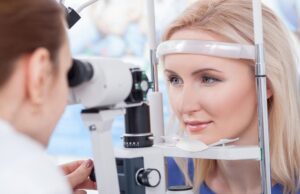We are frequently asked why the results of measurements vary during vision tests, even if the two examinations are carried out within a short interval. Differences in subjective refraction results can be caused by a variety of factors. We are able to walk you through these factors and what you need to do to ensure an optimal result.
The health of your eyes
Some people may find this unpleasant, but having your eyes checked regularly is absolutely necessary. But how do two measurements taken by your ophthalmologist at two different times vary, even if the second measurement occurs shortly after the first? Who is to blame? Can your ophthalmologist, your eyes or yourself really change so much in such a short time? This phenomenon is common. Various reasons can cause these differences in measurements. Typically, fluctuations are only about 0.25 diopters. Your ophthalmologist is well aware of this and knows how to proceed.
The visual performance of our eyes varies slightly depending on the time of day and is influenced by one factor: our biorhythm. Our physical condition is not the same throughout the day and has an impact on our visual performance. Hormone and blood sugar levels both play a vital role in determining the quality of our vision. Performing a visual test before breakfast or in case of insufficient fluid intake, for example, can have a real impact on the result.
You may have worked all day on the computer before going to your eye doctor. Your blinks are less frequent in this case and the tear fluid hydrates your eyes less, which can lead to dryness and eye fatigue, and obviously influence the result of the vision test.
The conditions under which the vision test is performed also influence the result. Needless to say, a rushed and superficial test won’t yield the same results as a test where you and your eye doctor take the time to achieve the required accuracy. This is called a subjective vision test. Here, it is essential that you collaborate with the ophthalmologist and communicate with him. It’s often the small details that can determine the visual quality of your new glasses. In addition, the quality of the measuring instruments as well as the experience and expertise of the ophthalmologist can have a decisive impact on the result.
It may come as a surprise to know that even the environment in which the test is performed can affect the result. To ensure these conditions are constant, no daylight should enter the examination room, as direct or indirect sunlight may affect the result. This is a phenomenon that photography enthusiasts know well: a different setting of the aperture of the camera changes the definition and brightness of the image. For many of us vision is different depending on whether the pupil is contracted and exposed to light or dilated in the dark. If, for example, visual performance at night and in low light conditions needs to be measured,
Our advices :
Always make an appointment with your ophthalmologist to perform a vision test. Do not go there unplanned, simply hoping to be examined. You and your ophthalmologist should have enough time to carry out a detailed and careful examination. ZEISS rates comprehensive vision analysis including consultation at one hour.
You must trust your ophthalmologist and feel that he or she is the right person for you to ensure better vision.
Contact lens wearers should wear their glasses for 24 hours before the test. During the test, contact lenses modify the geometry of the cornea, and therefore your visual performance.
Fluctuations in visual performance are frequently due to medications that can decrease tear fluid production. Your eyes become dry and you may experience eye fatigue.
Diabetes is also known to cause fluctuating visual performance depending on the time of day. It is recommended that diabetics perform vision tests at different times of the day and, if necessary, consult an ophthalmologist.
Our advices:
If your ophthalmologist does not routinely ask you this question, let them know about any drug treatment or if you have a chronic condition such as diabetes.
For the test, bring your current glasses and contact lenses and, if you have one, your contact lens prescription.
If this is your first time going to an ophthalmologist, indicate what you liked and especially what displeased you about your glasses in the past. The more you tell him, the better your glasses will be in the end.
Objective Refraction
You are certainly wondering if, insofar as it lacks precision, the traditional sight test (or subjective refraction) is absolutely necessary. The answer is yes. The ophthalmologist should be able to record your reaction to the different lenses he or she places in front of your eyes. Equally important: subjective refraction also tests how your eyes interact and see with your new glasses.
That’s not all: since the i.Profiler ®plus measures visual performance while the pupil is contracted (in bright conditions) and dilated (in low light conditions or in darkness), it is possible to determine if the night vision of the patient is worse than his day vision. The optician can use this information and plan the appropriate optimizations to integrate them into the lenses. This process has the great advantage of reducing the time required for carrying out the vision test.

